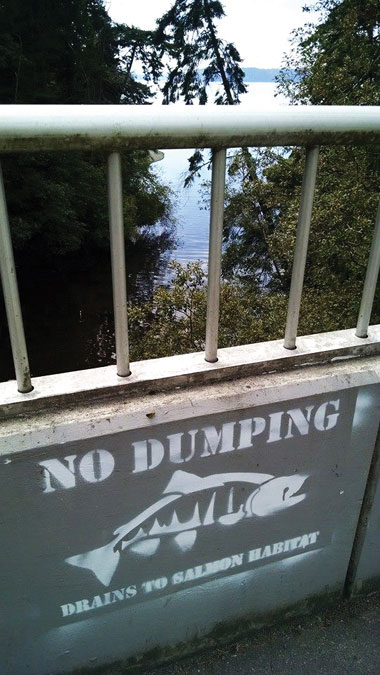By Brandi N. Montreuil, Tulalip News

TULALIP – Through the summer break, 175 storm drains on the Tulalip Indian Reservation received a mini makeover due to a collaborative effort between Tulalip Tribes Natural Resources department and the Goodwill Aerospace Program.
Receiving help from 20 students from the Marysville/Everett area who participated in the Goodwill Aerospace program, the drains, located near the Tulalip Resort Casino, Totem Beach Road and Totem Beach Loop Road, now display a stenciled salmon graphic and custom message reading, “No Dumping; Drains to Salmon Habitat.” Tulalip Natural Resources hopes the message will remind the public of the risks salmon habitat face.
“Many people have the misperception that a drain in a street or parking lot is sent to a wastewater treatment plant, but it is not,” explains Valerie Streeter, Tulalip Natural and Cultural Resources stormwater planner. “ After a rain storm, stormwater runoff enters the drain and is usually piped directly to a ditch, stream or bay with very little treatment. This water picks up heavy metals, copper from brake pads, Zinc from tires, and oils from engines, and delivers these pollutants to our waterways. Salmon are especially sensitive to copper, which alters their response to predators and damages their olfactory organs, how they smell. Zinc and oils also damage aquatic plants and animals.”
Students involved in the program were required to participate in service learning projects, which involves learning about the science and background of a project and then volunteer their time toward that project.
“Protecting our watersheds and salmon habitat are very important and we want the community to understand that dumping anything down storm drains can impair fish and other aquatic creatures because storm drains drain directly to streams, lakes, and even the bay,” said Kelly Finley, Tulalip Tribes Natural Resources Outreach and Education Coordinator.
Streeter explains that when people wash their cars or driveway and either dump or allow the dirty wash water into the storm drains, this contributes to water pollution. “It is better to wash your car on the lawn or use a car wash, which are connected to wastewater treatment plants. Pet waste is another common pollutant in our water, which can pass diseases on to other animals or even us humans.”
“The worst is an old practice of dumping used oil from an oil change into the storm drains,” said Streeter, who recommends discarding used oil at appropriate places, such as the automotive center at the Walmart Supercenter located in Quil Ceda Village, who will discard the oil free of charge.
For more information on how you can help in salmon recovery, please visit Washington State Recreation and Conservation Office’s website at www.rco.wa.gov/salmon_recovery/what_you_can_do.shtml.
Brandi N. Montreuil: 360-913-5402; bmontreuil@tulalipnews.com
